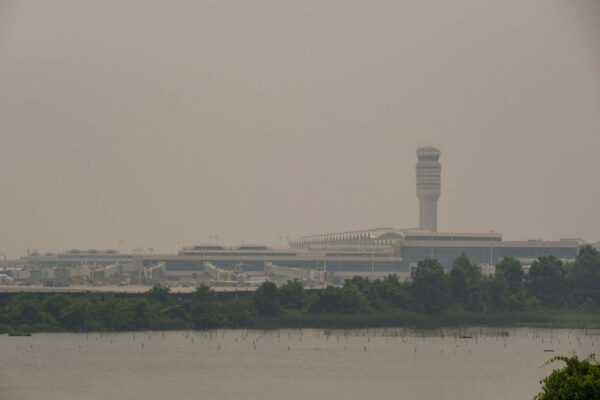
The concentration of Canadian wildfire smoke in Arlington and the D.C. area is expected to get worse tomorrow.
A Code Red air quality alert has been issued for the region on Thursday. That means that those with certain health issues should avoid outdoor activities and even healthy individuals should limit their time outside.
It comes after a hazy day today, with air quality readings in the lower Code Orange level. The current air quality index reading for Arlington is 137, just below the Code Red threshold of 150, according to AirNow.gov.
With hundreds of wildfires blazing in Canada, particularly Quebec and British Columbia, the area’s air quality will likely continue to fluctuate “over the next several days,” according to Fairfax County, as reported by our sister site FFXnow.
According to the Canadian Interagency Forest Fire Centre, three new fires started today, and there are 476 active blazes, about half of which remain out of control. The agency has recorded 2,988 fires in 2023 so far that have burned through 8 million acres of land.
More on the air quality forecast below, from the Metropolitan Washington Council of Governments.
The Metropolitan Washington Council of Governments (COG) has forecast a Code Red air day for the metropolitan Washington region tomorrow: Thursday, June 29. Code Red levels mean the air is unhealthy for everyone. Smoke coming from wildfires in Canada is contributing to the increased levels of fine particle pollution.
COG advises the following health precautions:
- Sensitive groups like people with heart or lung disease like asthma or emphysema, older adults, and children should avoid long or intense outdoor activities. Consider rescheduling or moving activities indoors.
- Healthy individuals should limit long or intense outdoor activities.
Residents can check current air quality conditions on COG’s website or the Clean Air Partners website.
The U.S Environmental Protection Agency also recommends the following during wildfire events:
- Take it easier during smoky times. If you can see or smell smoke, avoid strenuous activities such as mowing the lawn or going for a run.
- Reschedule outdoor work tasks and activities to a time when air quality improves. If outdoor tasks and activities cannot be rescheduled and must be conducted when air quality is poor, it is recommended that individuals reduce smoke inhalation by:
- Limiting the time spent outdoors by only performing essential activities.
- Taking frequent breaks indoors in places where the air is clean, especially during periods with high outdoor levels of wildfire smoke.
- If you must work outdoors, choosing a mask that will protect you like an N95 respirator mask. Cloth masks will not protect you from wildfire smoke.
- Using a portable air cleaner in one or more rooms. If you have a central air system in your home, use it to filter the air.
On unhealthy air days, COG advises the following actions to improve the air:
- Avoid lawn mowing or use an electric mower.
- Use gas or electric grills instead of charcoal.
- Fill your vehicles’ gas tank after sunset.
- Take transit, carpool, or work from home.
- Turn off lights and electronics when not in use and follow tips from your electric utility about how to use less electricity to cool your home.
COG provides air quality forecasts and current air quality conditions for metropolitan Washington. It also educates the public about voluntary actions people can take to reduce pollution and the health risks of bad air quality through its Clean Air Partners program, which is co-sponsored by the Baltimore Metropolitan Council.

